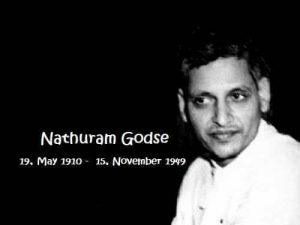Nathuram Godse and memory of 15th Nov 1949


Carrying in his hands a copy of the Bhagavad Gita, the map of undivided (Akhand) Bharat and a Saffron flag, he walked to the gallows. It was 15th Nov 1949 at Ambala jail, where Nathu Ram Godse was hanged. Committed to the belief for his motherland, his last wish was to keep his ashes until the day when Indus River is incorporated into independent India. Imagination dry and words fell short in explaining his belief, love and commitment for Akhand Bharat.
As Nathram Godse was approaching the scaffold, he called out “Akhand Bharat” and Narayan Apte his co companion who was hanged alongside completed – “Amar Rahe”.
Since then, “Godse” has remained a symbol of despicable hate, revenge and condemnation. Fury is such that any association or kinship till date is treated with utter disdain. Establishment under free India created intolerance to the extent that no author or organization could gather courage to evaluate and pen words.
Yes, he was proven guilty of killing no other than Gandhi jee, which he had confessed before the court. Without holding any remorse, guilt and grief, Godse in his justification “Why he killed Gandhi” had presented a 150 points statement before the High court of East Punjab, who in turn awarded him death sentence on 21st June 1949.
We had no Supreme Court in India until 26th Jan 1950 and so permission for appeal was placed before Privy Council by family members of Godse. It was a British law body, who in turn denied grant for appeal against the Judgment in British Federal court. Though India had attained freedom but the Judiciary was yet under British system of hierarchy.
Quoting Justice G D Khosla who was involved in the Gandhi murder case trial. “Concluding his book The Murder of the Mahatma, Khosla wrote, “I have no doubt that had the audience of that day been constituted into a jury and entrusted with the task of deciding Godse’s appeal, they would have brought in a verdict of ‘not guilty’ by an overwhelming majority”. But to quote Godse, his life also came to an end simultaneously with the shots fired by him at Gandhiji. And the reasons for the trial done in secrecy and the authorities’ reluctance to reveal before the public Godse’s replays to the charges leveled against him still remain something enigmatic”.
Godse’s justification as worded and read by him were replete with poignant words of merit and piercing sentences exposing the hypocrisy for Gandhiji. Over three Millions of Hindus/ Sikh killings, millions of abduction and rape, arsons, displacement and division of nation had shook his conscience. His arguments had the power to demolish the aura of Mahatma around Gandhi. So the trial was conducted in secrecy and no public scrutiny or revelation was permitted by the Government. Till date, the voices of curiosity about the fate of cross examination and arguments have not been obliged by the system. It is left to the Generation to come to evaluate thoroughly and form an informed opinion about Nathuram Godse.
Course of Justice was not completed for another accused Narayan Apte.
Dr Phadnis an advocate in his reply to Supreme Court in 2000 had submitted that the “Gandhi murder trial has not yet attained legal finality.”
Unlike Nathu Ram Godse, Narayan Apte had not confessed to his crime before the court. Yet he underwent a secretly held trial. Forget for an open court hearing, he was denied an appeal, denied a special leave petition by Privy Council and hanged hurriedly on 15th Nov 1949 without waiting for mere 71 days when the Supreme Court was set to be functional from 26th Jan 1950. The collateral casualty of incomplete justice took away the life of two minor children of Narayan Apte. His son died within a year of his execution and another one year old girl could not survive her childhood.
Indian Judicial system had been approached some time back under article 142 to examine the documents and seal the Justice for Narayan Apte which had failed the mandated legality before hanging a convict.
Today is 15th Nov 2020, a day to peep into history to examine and re-introspect the reason and follies of the worst ever bloodshed of partition that was carried on in Bharat. So many innocent lives were lost. Old kingdom perished and a new king emerged.
Cycle of life and death should never be condemned but judged for its accountability and accomplishment for humanity.
DISCLAIMER: The author is solely responsible for the views expressed in this article. The author carries the responsibility for citing and/or licensing of images utilized within the text.
